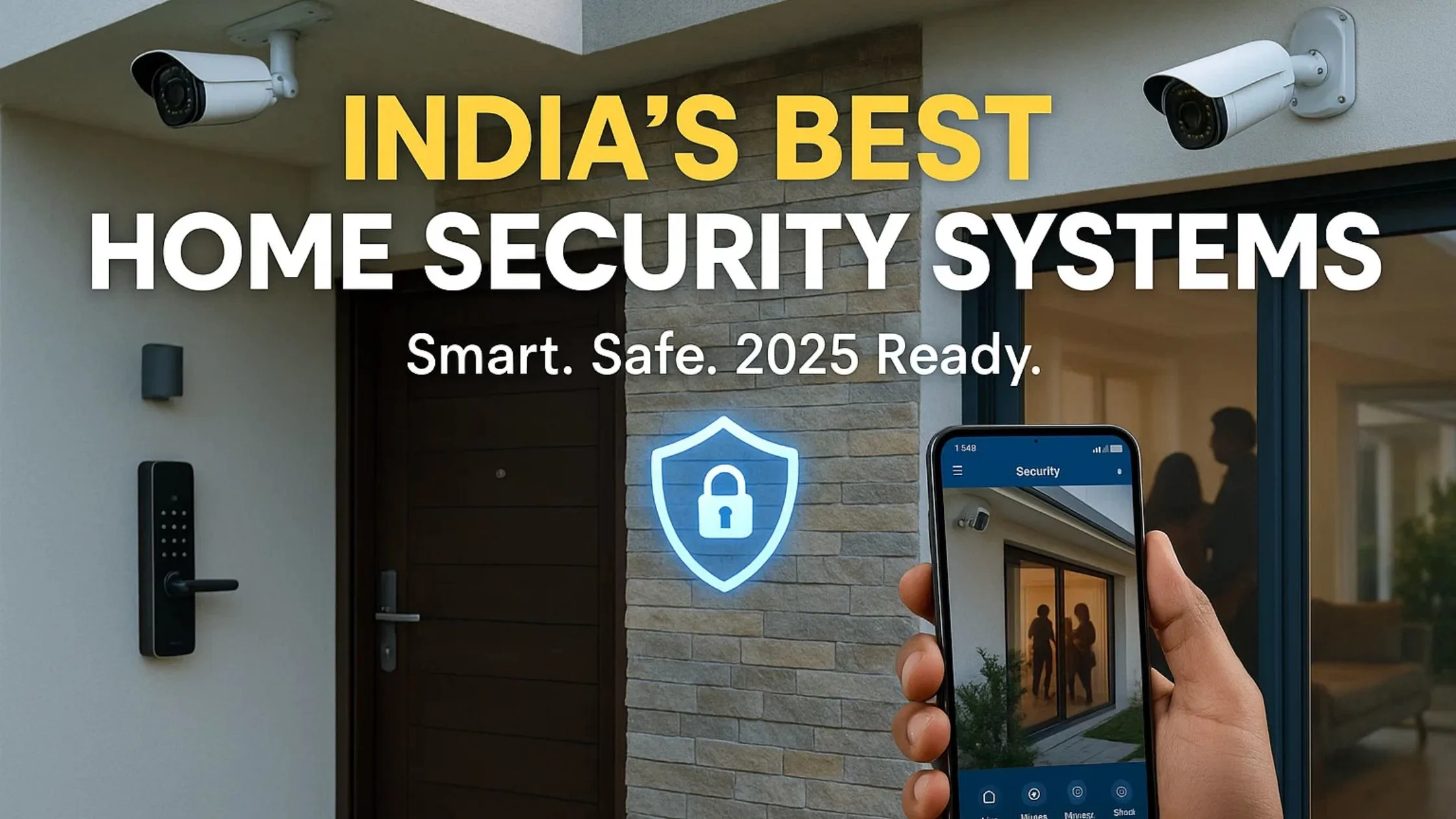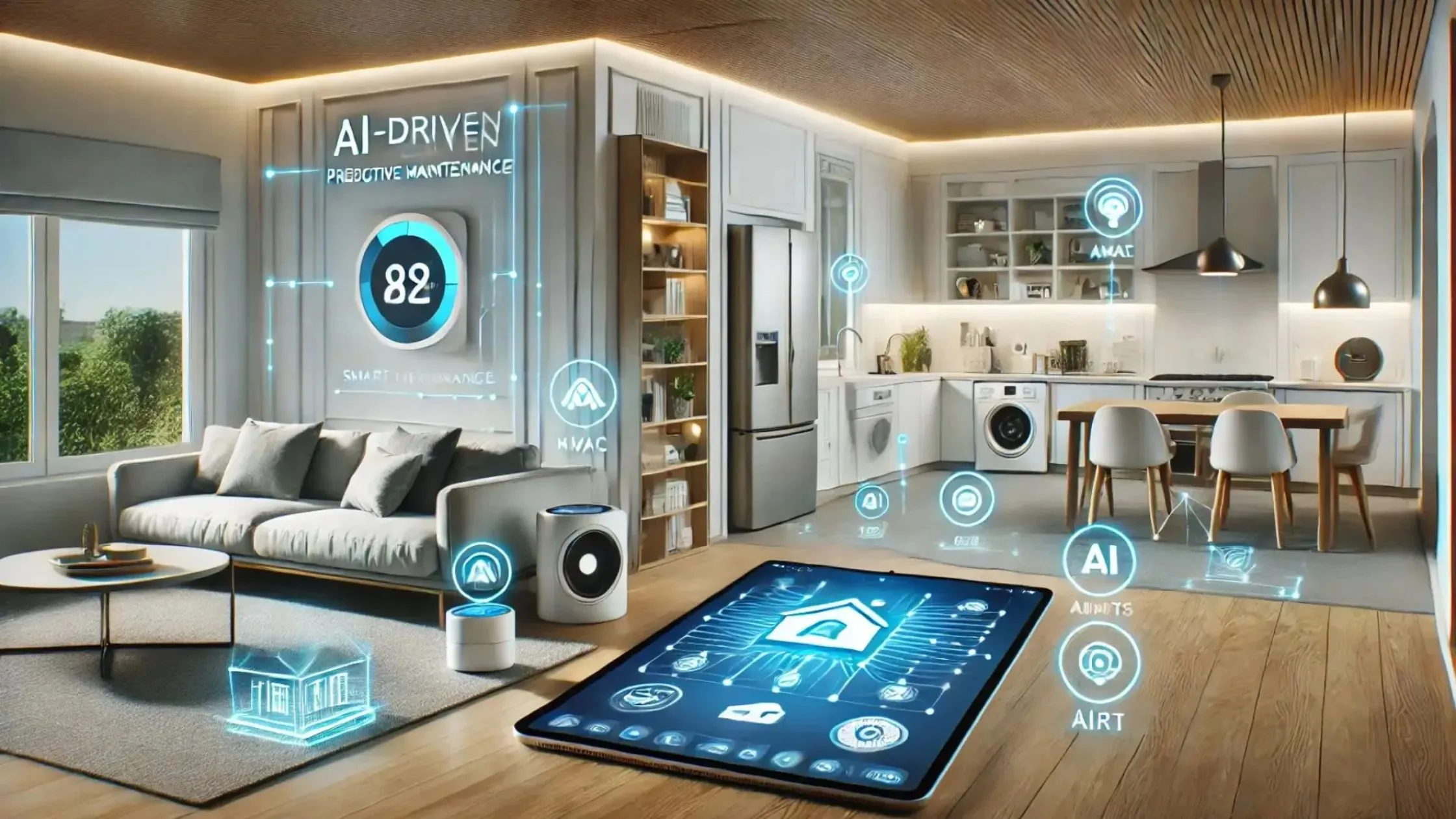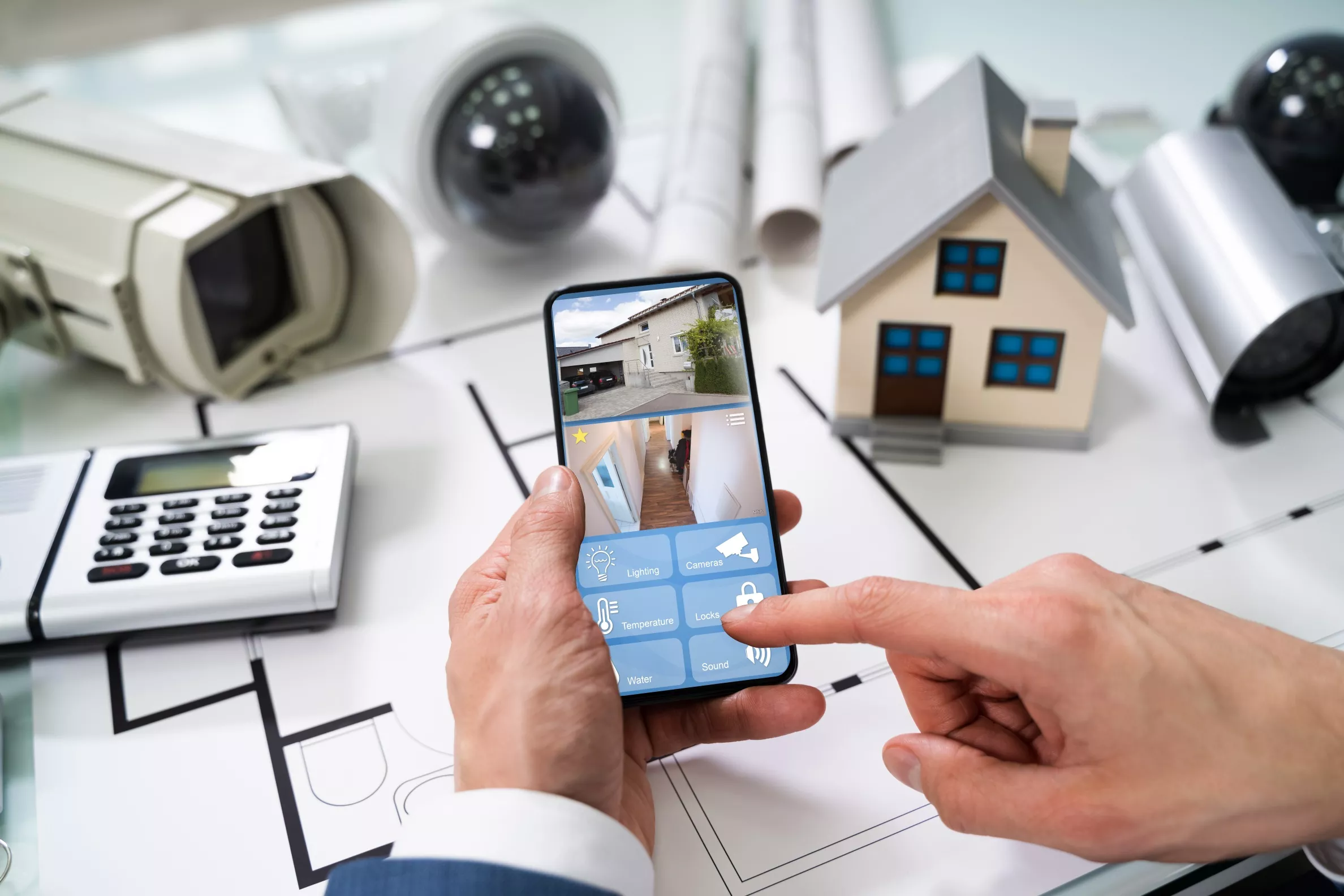Table of Content
▲
A home security system is a combination of electronic devices and technologies designed to protect your home from theft and emergencies. It typically includes cameras, alarms, motion sensors, and smart gadgets that work together to monitor activity around your home and alert you to any unusual or suspicious behavior.
Thanks to advancements in technology, modern home security systems in India are now smart, wireless, and easy to use. They can be connected through Wi-Fi and controlled via your smartphone, giving you complete access whether you're at home or away. These systems use the Internet of Things (IoT) to offer real-time updates, cloud storage, and remote access features.
Whether you're living in a flat, villa, or rental property, a home security system helps safeguard your family, belongings, and peace of mind. From basic anti-theft alarms to advanced two-way audio security systems, there are solutions for every budget and need.
Why Do You Need a Home Security System?
In today’s fast-changing world, keeping your home and family safe has become more important than ever. As cities grow and lifestyles get busier, the risks of theft, burglary, and other unexpected emergencies like fire, gas leaks, or even medical situations—have increased. That’s where a home security system becomes essential, not just a luxury.
Also Read: 9 Top Paying Guest Apps in 2025: Your Ultimate Guide to Hassle-Free Accommodation
Types of Home Security Systems
Choosing the right home security system depends on your home size, location, and lifestyle. Below are the main types of systems available in India today, with easy-to-understand descriptions:
1. Wired Home Security Systems
A wired home security system is a traditional type of security setup where all the devices such as cameras, sensors, alarms, and control panels are connected using physical cables. These systems are highly reliable and are often used in large homes, offices, and commercial buildings.
Unlike wireless or Wi-Fi-enabled systems, wired systems don’t depend on internet signals or batteries to function. Instead, they use a central control unit or DVR (Digital Video Recorder) to record footage and manage alarms.
Key features:
- Reliable and stable connection
- Requires professional CCTV installation
- Best for permanent homes or new constructions
- Works even without Wi-Fi (some models)
2. Wireless Home Security Systems
A wireless home security system is a modern security solution that uses Wi-Fi, Bluetooth, or radio frequency to connect all its components like cameras, alarms, motion sensors, and control panels without any physical wiring.
Unlike traditional wired systems, wireless systems are easy to install, move, and expand. Most can be controlled through a smartphone app and are part of the growing world of smart gadgets and the Internet of Things (IoT).
These systems are perfect for people living in apartments, rented homes, or anyone who wants a hassle-free, flexible, and smart home security system.
Key features:
- Easy to install no drilling or wiring
- Can be set up by yourself (DIY)
- Controlled via smartphone apps
- Great for rented homes or apartments
3. Monitored Security Systems
A monitored security system is a type of home security system that connects your home to a 24/7 monitoring service. This means when an alarm is triggered whether due to a break-in, fire, or motion detection a trained team is automatically alerted and can respond immediately by contacting you, the police, or emergency services.
Unlike basic systems that only notify the homeowner, monitored systems add an extra layer of protection by ensuring someone is always watching your property, even when you're asleep, at work, or on vacation.
Key features:
- 24/7 human monitoring
- Immediate response to alarms
- Ideal for people who travel often
4. Unmonitored Security Systems
An unmonitored home security system is a type of system that alerts only the homeowner (or selected family members) in case of an emergency, such as a break-in, motion detection, or fire. It works without professional monitoring services.
Instead of notifying a security company, the system sends alerts directly to your smartphone or sounds a loud alarm to scare off intruders. These systems are usually wireless, affordable, and controlled through a mobile app using Wi-Fi or Bluetooth.
Key features:
- No monthly fees
- Instant alerts via SMS or app
- Works well for smaller homes
5. DIY (Do-It-Yourself) Security Systems
DIY stands for Do-It-Yourself. In the context of a home security system, a DIY system is one that you can install and set up on your own—without hiring a technician or professional installer.
These systems are designed to be user-friendly, often wireless, and require minimal tools or technical knowledge. Most DIY systems come with a mobile app, clear instructions, and plug-and-play gadgets like Wi-Fi cameras, motion sensors, and wireless alarms.
Key features:
- Affordable and flexible
- Easy to install no expert required
- Expandable with additional gadgets like lights, sirens, etc
6. Smart Home Security Systems
Smart home security is an advanced type of home security system that uses technology and automation to protect your home. It allows you to monitor, control, and manage your security devices remotely using your smartphone, tablet, or voice assistant.
Smart systems are built on the concept of the Internet of Things (IoT) meaning that your cameras, alarms, sensors, door locks, and even lights can be connected, work together, and respond automatically to situations.
For example, if a motion sensor detects movement, your smart camera will start recording, lights may turn on, and an alert will be sent to your phone all without you lifting a finger.
Key features:
- Voice control and automation
- Linked through Wi-Fi and IoT gadgets
- Offers features like face recognition, two-way audio, and cloud storage
- Very user-friendly with real-time access
Summary Table
|
Type |
Best For |
Installation |
Needs Wi-Fi? |
Cost Range |
|
Wired System |
Large homes, offices |
Professional required |
No (some) |
Medium to High |
|
Wireless System |
Flats, renters |
DIY / Easy |
Yes |
Low to Medium |
|
Monitored System |
Frequent travelers |
Professional / DIY |
Yes |
High + monthly |
|
Unmonitored System |
Small homes, budget setups |
DIY |
Yes |
Low to Medium |
|
DIY System |
Beginners, budget users |
Very easy |
Yes |
Low |
|
Smart Security System |
Tech-savvy, smart homes |
DIY / Semi-pro |
Yes |
Medium to High |
Also Read: Top 9 Home Service Apps in India for 2025
Advantages of Home Security Systems
1. 24/7 Protection for Your Home and Family
One of the greatest advantages of having a home security system is that it offers continuous, around-the-clock protection. No matter where you are sleeping in your bedroom, busy at work, or traveling away from home your system is actively monitoring your property for any unusual activity. This includes threats like unauthorized entry, break-ins, fire, gas leaks, or even suspicious movement around the house.
- Security cameras record real-time footage
- Motion sensors and alarms alert you instantly
- You can view your home anytime from your smartphone via Wi-Fi
This round-the-clock protection brings peace of mind and reduces the chances of theft or damage.
2. Deters Burglars and Intruders
One of the most effective and immediate benefits of a home security system is its ability to deter burglars and intruders often before they even attempt to break in. Criminals typically look for easy targets, and when they see a home equipped with visible security gadgets like cameras, wireless alarms, or smart locks, they are far less likely to make a move.
- Flashing lights, loud alarms, and visible cameras scare intruders
- Many burglars choose easier targets without security gadgets
It’s a proven fact that homes with security systems are less likely to be broken into.
3. Remote Access and Control
One of the most powerful features of a modern home security system is the ability to monitor and control it remotely. With the help of smart gadgets and the Internet of Things (IoT), homeowners can now stay connected to their security systems anytime, anywhere directly from their smartphones, tablets, or laptops.
Whether you're at work, on vacation, or simply in another room, you can easily check in on your home in real-time. Most systems offer Wi-Fi-enabled mobile apps that provide full access to your system's features.
- Monitor live camera footage
- Lock or unlock smart doors
- Switch lights on/off remotely
- Speak to visitors via two-way audio security systems
This remote access adds convenience, especially for working professionals and frequent travelers.
4. Quick Emergency Response
One of the most important advantages of a home security system is its ability to respond immediately in an emergency. Whether it's a break-in, fire, gas leak, or motion detected while you're away, today’s smart security systems are built to act fast. This quick response can make all the difference in protecting your home, family, and belongings.
Many modern security systems are connected either to a 24/7 monitoring service or to a set of emergency contacts such as family, friends, or neighbors. When a sensor is triggered such as a door being opened unexpectedly or motion detected inside your home the system automatically sends an alert.
- The homeowner via phone or app
- Neighbors or family members
- Local police or emergency responders (in monitored systems)
In critical moments, these quick alerts can prevent larger losses or harm.
5. Useful in Non-Theft Situations
While most people think of a home security system as protection against theft and break-ins, its benefits go far beyond just preventing crime. Thanks to modern smart gadgets and the Internet of Things (IoT), today’s systems can also play a vital role in responding to non-theft emergencies keeping your home and family safe in a variety of situations.
- Fires (through smoke detectors)
- Gas leaks (via smart sensors)
- Medical emergencies (with panic buttons or emergency alerts)
- Child or pet monitoring (with indoor cameras and smart notifications)
This makes the system useful for safety beyond just anti-theft purposes.
6. Easy to Use and Install (Especially Wireless Systems)
One of the biggest reasons why more people are choosing modern home security systems is their ease of use and installation. Unlike traditional wired systems, today’s wireless and Wi-Fi-enabled gadgets are designed with simplicity in mind. You don’t need to be a technical expert or hire a professional to set them up.
Most wireless home security systems come in DIY (Do-It-Yourself) kits, which include all the essential components like cameras, sensors, sirens, and control panels along with clear instructions. These devices are often plug-and-play, meaning you just need to mount them (usually with adhesive strips or screws), connect them to your home’s Wi-Fi network, and configure settings through a mobile app. There’s no complex wiring, drilling, or networking required for the average user.
Disadvantages of Home Security Systems
While the benefits are many, there are some drawbacks to be aware of before making a purchase:
1. High Initial Cost
One of the common concerns for homeowners when considering a home security system is the initial investment cost. A complete setup that includes high-quality cameras, motion sensors, smart alarms, smart locks, and other safety gadgets can cost anywhere between ₹5,000 to ₹25,000 or more depending on the brand, features, and size of your home.
- Wired systems require CCTV installation which adds to cost
- Smart features like cloud storage and AI detection may cost extra
- Professional monitoring (if used) involves monthly fees
Budget-conscious users may find the upfront cost high, although basic DIY systems are more affordable.
2. Internet Dependence (For Wireless Systems)
While wireless home security systems offer great convenience, easy installation, and smart features, one major drawback is their reliance on a stable internet connection, particularly Wi-Fi. These systems use your home’s internet to connect all components like cameras, sensors, alarms, and mobile apps. If the internet goes down or your Wi-Fi signal is weak, the system’s functionality can be significantly affected.
- Remote access is lost without internet
- Cameras may not record or stream during outages
- Real-time alerts can be delayed
This can be a concern in areas with unstable network connectivity.
3. False Alarms and Notifications
While home security systems are designed to protect your home and give you peace of mind, they sometimes generate false alarms or unnecessary notifications. These alerts can be triggered by harmless movements or technical errors, which may cause confusion, inconvenience, or even unnecessary panic especially if you are away from home or asleep.
False alarms can be caused by several common factors, especially in systems that rely on motion sensors, wireless alarms, or smart cameras.
Common Causes of False Alarms:
- A passing pet or moving curtain may activate a motion sensor
- Poorly placed cameras may detect vehicles or outside movements
- Sudden power cuts may affect alarm behavior
Modern smart systems have improved accuracy, but it’s still important to adjust sensitivity settings.
4. Regular Maintenance Needed
Just like any other technology in your home, your home security system requires regular maintenance to keep working effectively. While today’s wireless and smart systems are designed to be user friendly and low maintenance, they still need occasional attention to ensure they’re always ready when you need them most.
Many homeowners set up their security systems and forget about them until something goes wrong. But neglecting maintenance could result in system failure during emergencies, delayed alerts, or loss of video footage. A few simple routine checks can help you avoid major issues and extend the life of your equipment.
- Replace batteries in wireless gadgets
- Clean camera lenses and outdoor equipment
- Check Wi-Fi connections and update software regularly
Neglecting maintenance can lead to system failure at the worst time.
5. Privacy Concerns
While home security systems are designed to make us feel safe, they can also raise privacy concerns especially in today’s digital world where many devices are connected to the internet and store data in the cloud. Some homeowners worry about how their personal video footage is stored, who can access it, and whether it might be misused or leaked. These concerns are valid and should be taken seriously.
- Footage is stored online
- Smart devices are connected to third-party apps
- Systems are accessed by multiple users
To avoid this, always choose trusted brands with data protection features.
Also Read: 9 Best Companies for Choosing the Best Wire for Home Use in 2025
Conclusion
A home security system is no longer a luxury; it's a necessity in today’s world. With rising safety concerns and advancements in technology, protecting your home has become easier, smarter, and more affordable than ever before. Whether you choose a basic wireless system, a smart DIY setup, or a monitored professional service, what matters most is selecting a system that fits your lifestyle, home size, and budget.
From CCTV cameras and motion sensors to two-way audio systems and cloud-connected gadgets, there’s something for everyone in the Indian market today. By choosing the right system and maintaining it regularly, you can enjoy 24/7 peace of mind knowing your home and loved ones are safe.
Make sure to compare features, check for reliable customer support, and choose trusted brands with strong data protection measures. Remember, a secure home is a happy home.


_1770964981.webp)






_1770976628.webp)
Ans 1. For small flats or rented homes, wireless DIY systems with mobile app control are ideal. They are affordable, easy to install, and don’t require drilling or wiring.
Ans 2. Yes, most smart and wireless systems need a stable Wi-Fi connection for live streaming, alerts, and remote control. Wired systems may not need the internet but often lack remote access.
Ans 3. Not all systems require CCTV. Many modern setups use Wi-Fi-enabled cameras that you can install yourself. However, for wired systems or large properties, professional CCTV installation is recommended.
Ans 4. Yes. Most DIY home security systems come with simple installation guides and mobile apps. These systems are plug-and-play and don’t require technical knowledge.
Ans 5. Prices range from ₹5,000 to ₹25,000 or more, depending on features like cloud storage, number of cameras, alarms, and brand. DIY kits are usually more budget-friendly.